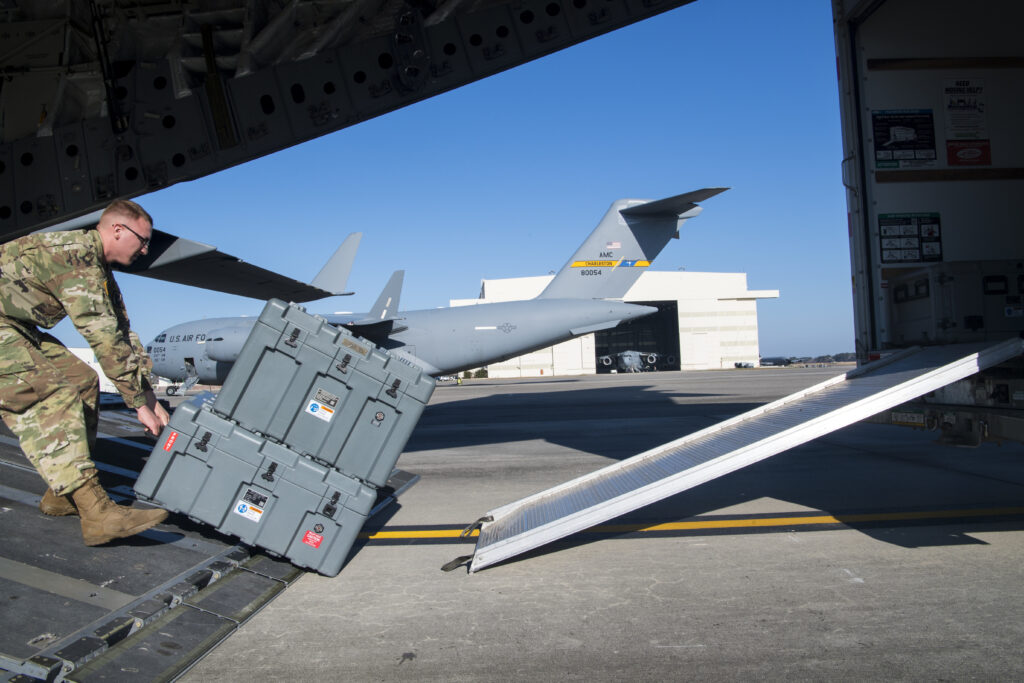Air Warfare, Land Warfare, Naval Warfare
COVID-19: TRANSCOM To Evacuate Americans From Foreign Hotspots With CRAF

C-17 being kitted out at Joint Base Charleston in South Carolina
WASHINGTON: Transportation Command is moving rapidly to help bring US citizens home from countries seriously affected by the COVID-19 coronavirus pandemic — with the first mission to take place Thursday.
“The first is scheduled for Nigeria,” Gen. Stephen Lyons, TRANSCOM chief told reporters today, involving transport of “150 passengers” to Washington Dulles Airport in Virginia by civil aviation aircraft. The State Department will take over testing for the virus and processing re-entry. He added that “another half a dozen efforts” are now scheduled. This comes after the State Department issued a warning earlier in the day.
“Americans who wish to return home from abroad should so immediately and make arrangements to accomplish that,” Secretary of State Mike Pompeo said today during a briefing. “We do not know how long the commercial flights in your countries may continue to operate,” he said. “We can’t guarantee the U.S. government’s ability to arrange charter flights indefinitely where commercial options no longer exist.”
Lyons said he expects a ramp-up such missions in Central and South America, as well as the Indo-PACOM region.
TRANSCOM was given the order Friday by Defense Secretary Mark Esper to support the State Department’s Repatriation Task Force in contracting commercial airliners and managing traffic flow for evacuations. TRANSCOM oversees commercial carriers participating in the Civil Reserve Air Fleet (CRAF) who can be called on for emergencies.
“The State Department requested assistance from the Department of Defense when the scale of the effort to repatriate Americans and lawful permanent residents strained the agency’s capacity,” TRANSCOM said in a press release.
“We’re their overflow valve,” Lyons said.
The repatriation missions are also one way for the federal government to support the US commercial passenger airline industry, he added, which has been hammered by the pandemic as borders are closed and domestic passengers have cancelled most travel plans.
Lyons expressed concern about the future health of the civil aviation sector, saying “as we take on missions, we are looking for opportunities to workload to our commercial partners.”
He is also worried about the commercial moving industry DoD works with when service members change bases — another sector of the transportation market that has been hit hard by the pandemic, made even worse by the fact that it comes right at the time of year the sector normally does the bulk of its business.
“I’m very, very concerned, especially for our small biz partners that make up so much of household goods moving industry,” Lyons said. He said he is hopeful that the $2 trillion COVID-19 relief package passed by Congress last week will help, noting that he is “watching that very closely.”
And the Army announced today that it is working hard to support the defense industrial base by assessing current contract terms and supply chain impacts.
“Our mission of delivering materiel capabilities to the warfighter is accomplished by the total force, including military, civilian and Defense Industrial Base partners,” Bruce Jette, Army assistant secretary of for Acquisition, Logistics and Technology, said in a written statement.
Lyons explained that TRANSCOM also expects to become more active in its support of the Federal Emergency Management Agency and the Department of Health and Human Services, in missions such as transporting virus test kits and moving field hospitals to hot spots such as New York and Washington state.
“We’ve transported 3 million test swabs in support of Health and Human Services,” he said. Those swabs went to Memphis, Tennessee — a major FedEx hub — where they will be distributed by HHS and FEMA.
Air Force Chief of Staff Gen. David Goldfein mentioned support of HHS, and movement of virus test kits into Memphis in a briefing with reporters on March 18, but did not go into detail.
Asked by reporters about whether TRANSCOM would be involved in moving virus-stricken sailors ashore off the USS Theodore Roosevelt, Lyons explained that the Navy itself is normally in charge of its own missions and that TRANSCOM has not been tasked to support the ship.
“They’ve got a lot of internal capacity,” he said.
As for TRANSCOM COVID-19 cases, Lyons would not give specific numbers of infected personnel but said the number was “in the single digits.” The command is working hard to deal with the difficult task of isolating personnel, particularly on airlift missions to so-called Category 3 countries where the virus is rampant. “Obviously in the cockpit there is no way to get six feet apart,” he said. “You can’t telework and fly a plane, at least not on the lift side of the house.”
Lyons said measures include transferring crews directly to on-base billets and keeping them there, ordering food and otherwise trying to “create a very concerted cocoon” around crews.
Lastly, Lyons said TRANSCOM is working with NASA and other federal agencies to figure out virus transmission factors such as air flow in enclosed spaces to find ways to increase DoD’s limited capacity to transport contagious patients by air ambulance of the Transportation Isolation System developed during the Ebola outbreak in 2014. As of today, he said, TRANSCOM has moved only one such patient, from Djibouti to Germany.
“We are working, candidly, to increase capacity to meet these kinds of requirements,” he said.
Colin contributed to this article.